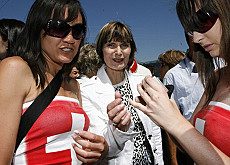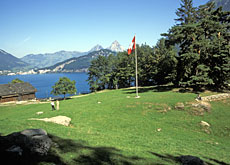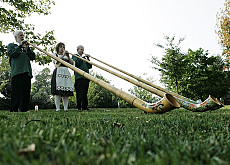Swiss president calls for more integration

The Swiss president for 2007, Micheline Calmy-Rey, has called for better integration of foreigners in a speech to mark Swiss National Day on the Rütli meadow.
Police on Wednesday prevented dozens of rightwing extremists – who have in previous years disrupted the celebrations – from reaching the site, which is near Lake Lucerne.
In her speech, Calmy-Rey said she understood that some people feared losing their identity, but she said that peaceful coexistence with other cultures was the only solution.
It was important to put the emphasis on what united people, rather than what separated them.
“We know how to do this – Switzerland has always been a land of emigration and immigration,” said Calmy-Rey. “We have to decide: integrate or exclude.”
She said there were forces in politics which sought to exploit people’s fears. In previous times Italian immigrants were the target, nowadays, it was the Muslims, explained the president.
This policy was “unacceptable and ill-timed” because exclusion did not solve the problems, but only made them worse, said Calmy-Rey, who is from the centre-left Social Democratic party.
She admitted, however, that crime among young foreigners – a favourite topic of the Swiss political right – was high, but said this was a social not ethnic problem.
Vision of patriotism
The president also gave her vision of patriotism, which she said was a concept that belonged to everyone.
But she said it was unacceptable for some groups to try and hijack the Rütli celebrations.
In today’s globalised world, “freedom of expression, of gathering together and of religion are now more than ever part of our Swiss identity”, said Calmy-Rey.
Calmy-Rey had termed this year’s celebrations the women’s Rütli, Many of the guests were women and they welcomed her enthusiastically.
Turning to equality between the sexes, Calmy-Rey said women still earned on average 20 per cent less than men and they still had to make headway in politics.
“[Equality] cannot be achieved through nice speeches and constitutional laws. It is time to act to change things,” she said.
Security was high at the event, which very nearly did not take place this year. Disruptions in previous years by rightwing extremists, particularly in 2005, had led the organisers to question whether it should take place at all. A row also broke out about who should foot the bill for the higher security costs.
Calmy-Rey nevertheless announced plans to hold a traditional celebration for women along with the speaker of the House of Representatives, Christine Egerszegi. Funds for security were eventually provided through private donations.
Extremists turned back
Police boats armed with water canons turned back two groups of activists in inflatable dinghies who were crossing Lake Lucerne in the direction of the Rütli.
A further 65 far-right supporters were stopped as they tried to reach the meadow on foot, cantonal police declared. There were protests, but no violence, officials said.
Police are also investigating a small explosion which occurred just after the ceremony ended. A small explosive device buried in the ground, thought to be a distress flare or firework, went off some 30 metres from the speakers’ podium.
In all, around 2,000 visitors were expected at the Rütli.
For her part, Egerszegi praised direct democracy – the backbone of the Swiss political system.
“We are extremely lucky to be able to decide our fortunes for ourselves, [and] to shape the society in which we live,” she said.
Compromises were Switzerland’s strength, she added, before calling on Swiss citizens to use their voting rights whenever they could.
As for the Rütli, Egerszegi said the meadow was greatly symbolic for Switzerland and represented the start of the country’s continuing success story.
swissinfo with agencies
Legend says that it was there on August 1, 1291, that representatives from three forest cantons around the lake of Lucerne – Uri, Schwyz and Nidwalden – met amidst continuing Habsburg repression to sign a pact of eternal mutual defence.
This is said to have laid the foundation of the Switzerland of today.
1291 is taken as the birth date of the country, and August 1 is the official Swiss national holiday.
On July 25, 1940, under threat of a Nazi invasion, Switzerland’s commander in chief, General Henri Guisan, held ceremony at the Rütli in which the entire Swiss officer corps reaffirmed their allegiance to the confederation and to Swiss neutrality.
Several other cabinet ministers have been giving speeches at various locations across the country. Some comments were made on July 31.
Justice Minister and rightwing Swiss People’s Party leading light Christoph Blocher spoke out against what he called limits to people’s democratic rights through legislation.
Party colleague Samuel Schmid, the defence minister, has called for solidarity with the weak and has warned against populism.
Doris Leuthard, the economics minister, pointed to the duties and rights of Swiss citizens in her speech. She will also be speaking at the National Day event in Berlin.
Finance Minister Hans-Rudolf Merz lent his support to federalism and praised the tax competition between cantons in his comments published on July 31.
Moritz Leuenberger, who holds the transport and environment mandates, spoke of more solidarity between the regions.

In compliance with the JTI standards
More: SWI swissinfo.ch certified by the Journalism Trust Initiative


You can find an overview of ongoing debates with our journalists here. Please join us!
If you want to start a conversation about a topic raised in this article or want to report factual errors, email us at english@swissinfo.ch.